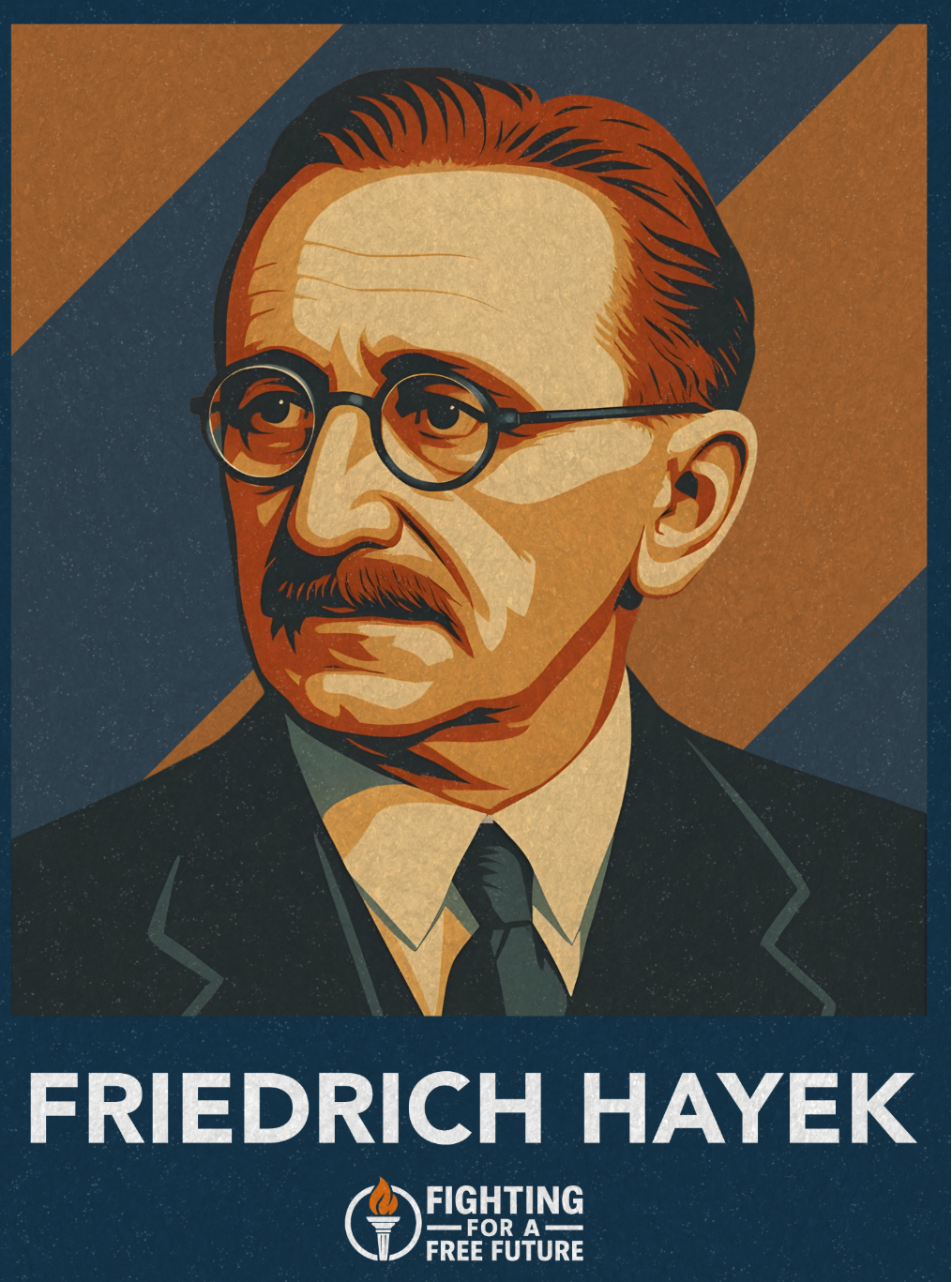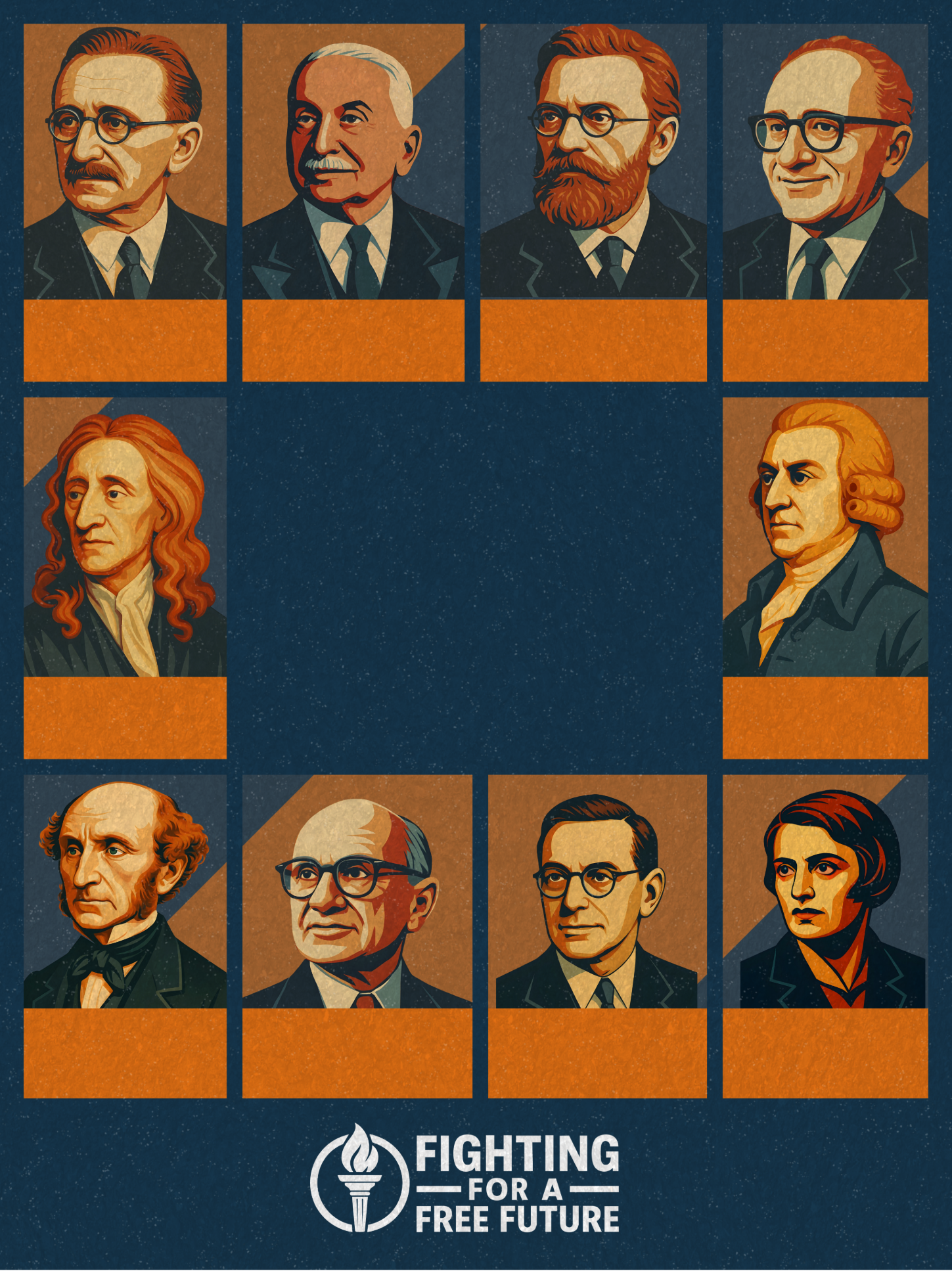An ode to a free future
How is the future going to be? This is a question that concerns everyone, everywhere.
We are pleased to continue our series of weekly guest articles from leading and rising figures of the free market movement. We are also very excited to launch the first episode of The Insurgency with Steve Baker tomorrow. Subscribe now at podcast.fightingforafreefuture.com
How is the future going to be? Are we destined by the materialist laws of history, as Marx argued? If so, then any struggle is meaningless; only the blind mechanics of history would determine what comes next. I don’t think so. Both history and theory show us that the so-called “laws” of historical materialism failed in theory and in practice. But the question remains: is the future good or bad? Will we be free, or not?
Karl Popper offers an answer: The future is open1. It is not predetermined, nor does it demand either optimism or pessimism. It is in our hands to build a free and prosperous future, or if we fail, a world where freedom is slavery, ignorance is strength, and war is peace. As Popper wrote: “The future is open, and we have a responsibility to do our best to make the future still better than the present. But this responsibility presupposes freedom.” Our responsibility, then, is to work toward a free future. But how?
Some argue it can be achieved through strong institutions imposed from above. Others say economic growth will deliver it. Still others look to a mission-directed government. But something deeper is required. Something no law, constitution, or administrative state can substitute for: the tradition of liberty.
As Hayek said in his Cairo speech: “Of course, the possession even of the most perfectly drawn up legal codes can be no adequate substitute for a deeply rooted tradition.”2 Institutions and rules are just the visible tip of the iceberg. What sustains freedom is the ideas that ordinary people hold. That is why a free future is impossible without a change in the climate of opinion: in the questions journalists ask, in the books intellectuals write, and today, in the podcasts people record and listen to.
The good news is that we already have such a tradition of liberty. Hayek argued that the Enlightenment from Voltaire onward was largely the spreading of the ideal of freedom that its leaders saw in England. David Hume summed up English history as a movement from “government of will” to “government of law.”3 English liberty amazed thinkers across Europe. The French legal theorist De Lolme, whose work influenced the American Founders, once wrote that the uniqueness of the English government lay in the recognition that true freedom could be achieved because of its frame4, that frame being the limitation of power. Limiting power is a forgotten art we must revive.
After World War II and the spread of democracy, many thinkers assumed that if a government was democratic, then its power needed no limits. If government was “by the people,” why should the people be restrained? The answer is simple: people often make bad decisions when ruling over others, even if they make good ones for themselves. The post–World War II managerial consensus views every problem as a question of what the state should do to solve it. There are several issues with this approach. First, it strips agency from individuals and communities who, as Elinor Ostrom observed, are often far better at solving problems than distant bureaucrats. Second, public choice theory reminds us that politicians are not omnipotent angels but, like the rest of us, self-interested actors. When granted greater power and control, they are unlikely to use it to maximise public welfare; rather, they will seek to advance their own interests—interests that, unlike in markets, do not necessarily align with those of others. To move beyond managerialism, we must preserve the old fire of liberty.
Preserving the Fire of Liberty
Marx was wrong: tradition is not a nightmare. The tradition of liberty can be the backbone of a free future. But there is a risk: accepting tradition as a whole, sticking to the status quo, and refusing to change. That is not what we need. What we need is a critical embrace of tradition: drawing on it without becoming trapped by it. Gustav Mahler expressed this beautifully: “Tradition is not the worship of ashes, but the preservation of fire.” To preserve the fire of liberty, we need a revival of classical liberalism.
Throughout history, authors have described the strange death of ideas. Douglas Murray speaks of the strange death of Europe. George Dangerfield wrote of the strange death of Liberal England. Today, we face the strange death of classical liberalism. The soul of civility itself is under attack. Across the political spectrum, few hesitate to expand state power—so long as their party wields it. That is the strange death of liberalism: scepticism of unlimited power is fading, replaced by partisan opportunism. But the point of limiting the state is precisely that no one is perfect, no one knows everything, and no one is God. We must resist the temptation to play God. Instead of empowering the state, we must empower citizens.
How can this revival happen?
Earlier, I pointed to tradition, but now we can be more specific: we need to build. As Mises argued, socialism is not constructive but destructive. It consumes what others have built, rather than producing something new. Prosperity expands human choice, and freedom makes prosperity possible. But we must remember: growth should not be our ultimate goal. As unpopular as it may be for a free-marketeer to say, growth is only a byproduct of freedom. Our North Star must be liberty itself.
Freedom creates the conditions for growth, innovation, and competition, but it is more than statistics or percentages. It is about human dignity. A life dictated by governments is not a fulfilling life. Imagine a world where the state decides what you can read, which job you may hold, or which business you are allowed to run. Such a life is not worth living. The uncertainty and responsibility of freedom are far greater than the false pretence of certainty offered by a life planned from the top down. Freedom means enabling the impossible and opening the door to new possibilities. As Deirdre McCloskey reminds us: if you give a man a fish, you feed him for a day. If you teach him to fish, you feed him for months. But if you give him freedom, he and his descendants can prosper for generations.
That is the promise of liberty. That is the ode to a free future.
Mani Basharzad is an economic journalist. He is currently at the Institute of Economic Affairs, an Asia Freedom Fellow at King’s College, and a regular columnist for CapX. His work has appeared in MoneyWeek magazine, among other publications.
The images included in this piece, among other leaders for freedom throughout history, are available to purchase as posters and on t-shirts.
Karl Popper, All Life is Problem Solving
F. A. Hayek, The Market and Other Orders, ed. Bruce Caldwell (Chicago: University of Chicago Press, 2014), 147.
David Hume, The History of England from the Invasion of Julius Caesar to the Revolution of 1688, new ed., corrected (London: A. Miller, 1762), 5:280.
Jean Louis de Lolme, The Constitution of England; or, An Account of the English Government: In Which it is Compared Both with the Republican Form of Government, and the Other Monarchies in Europe [1784], new ed., corrected (London: G. G. and J. Robinson, 1800), 441.




